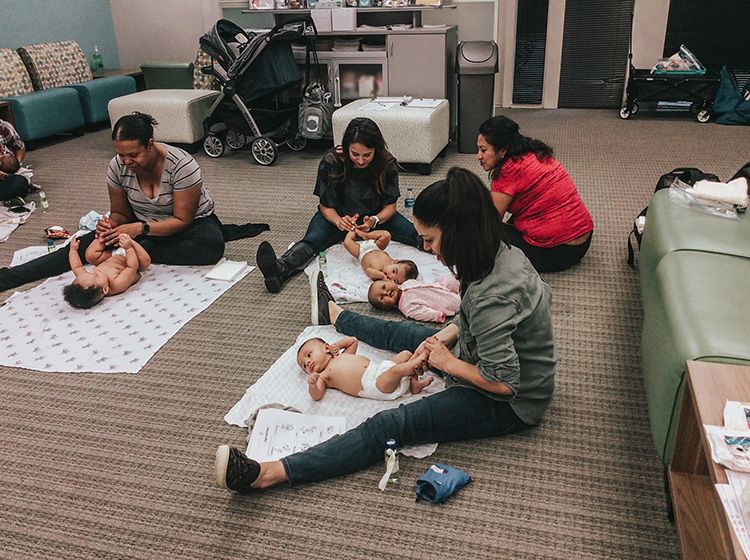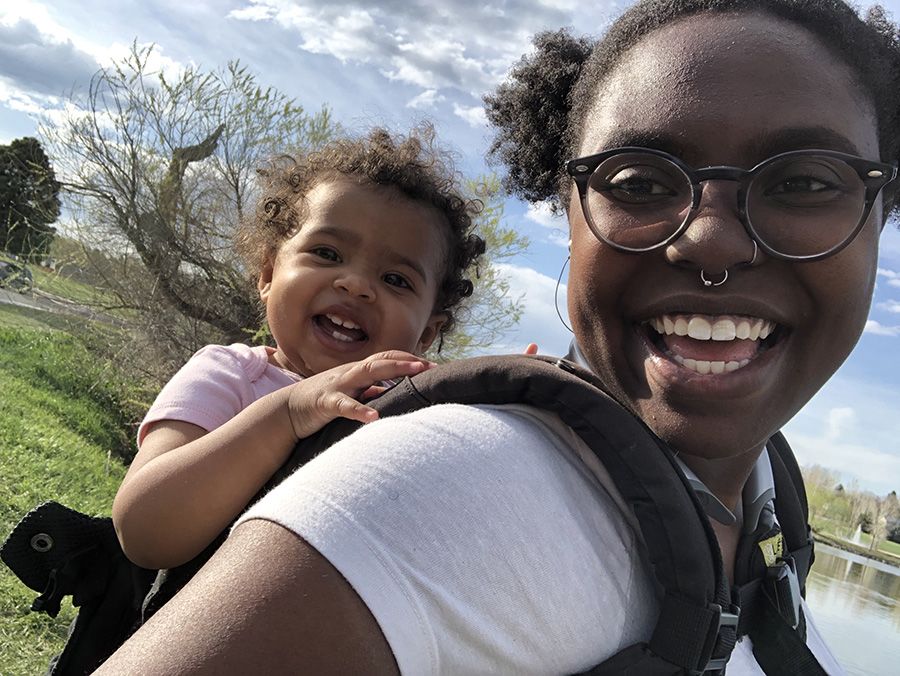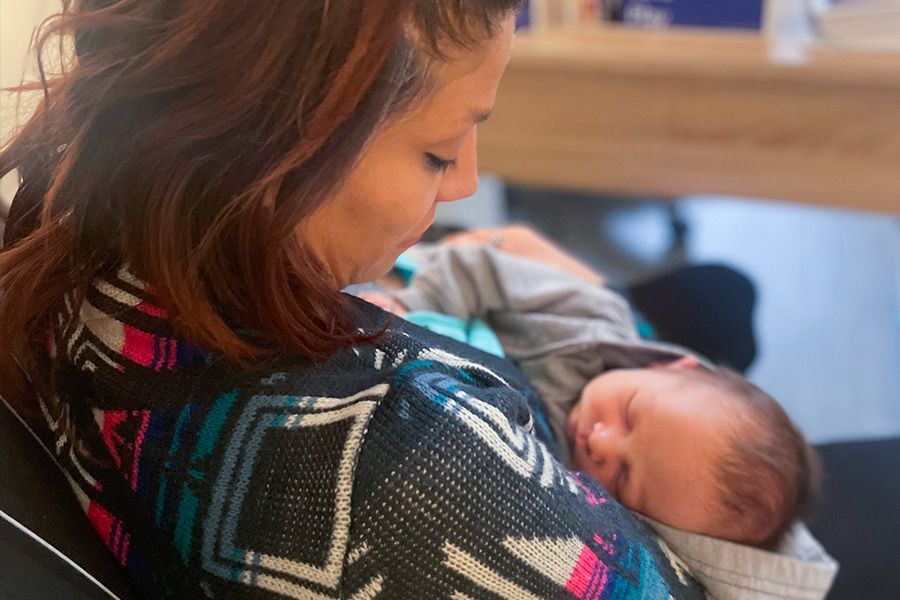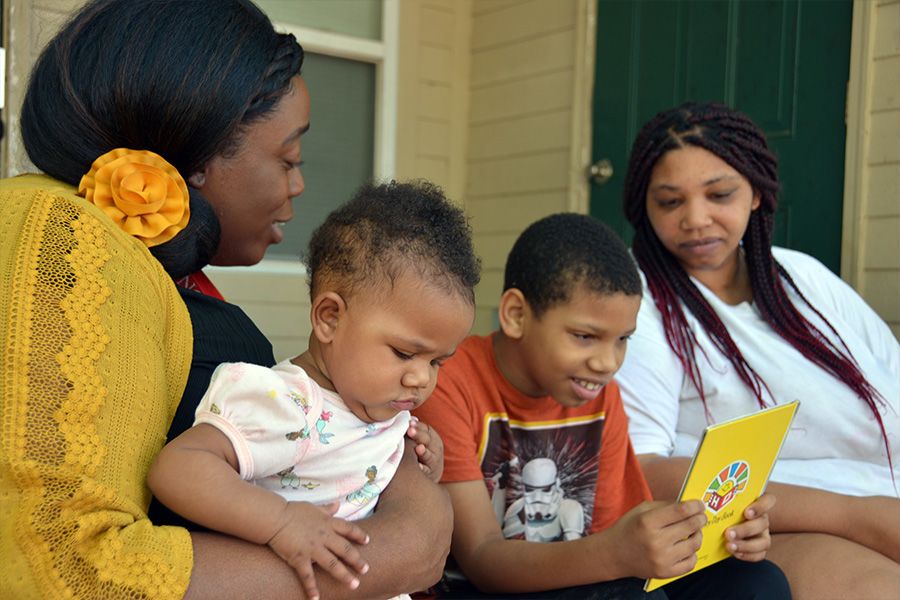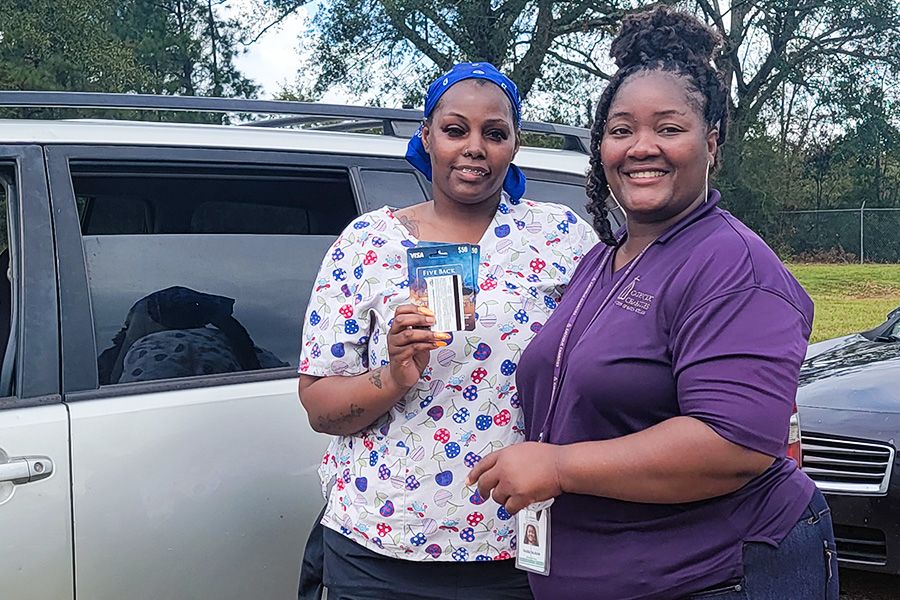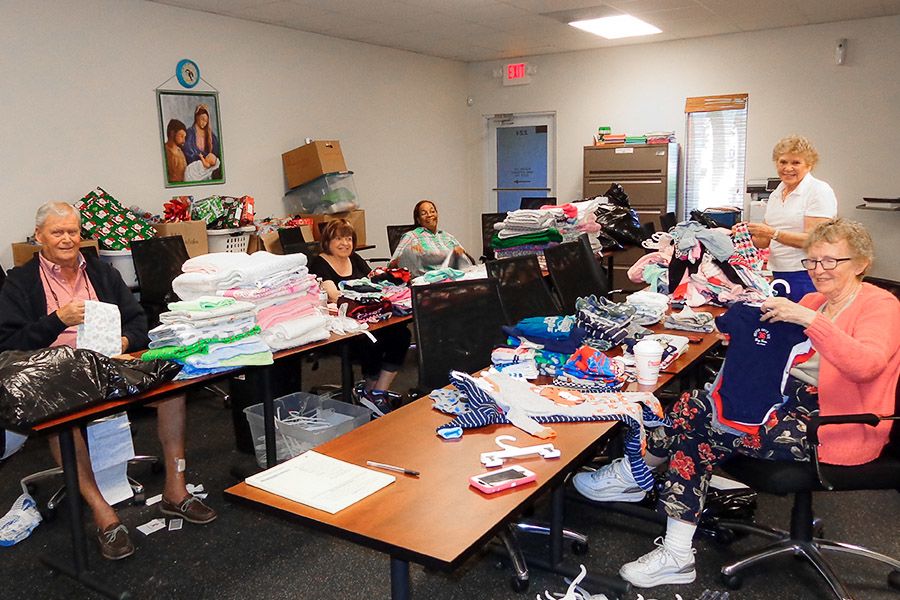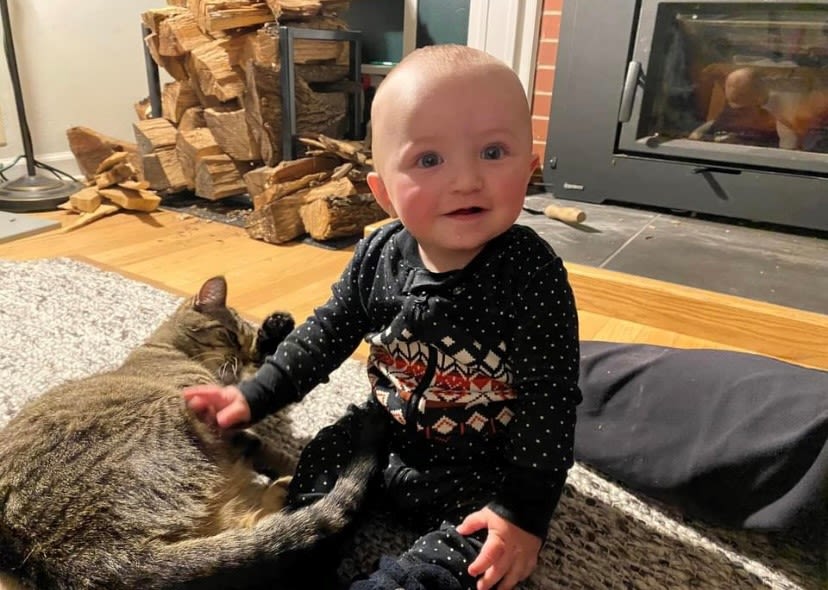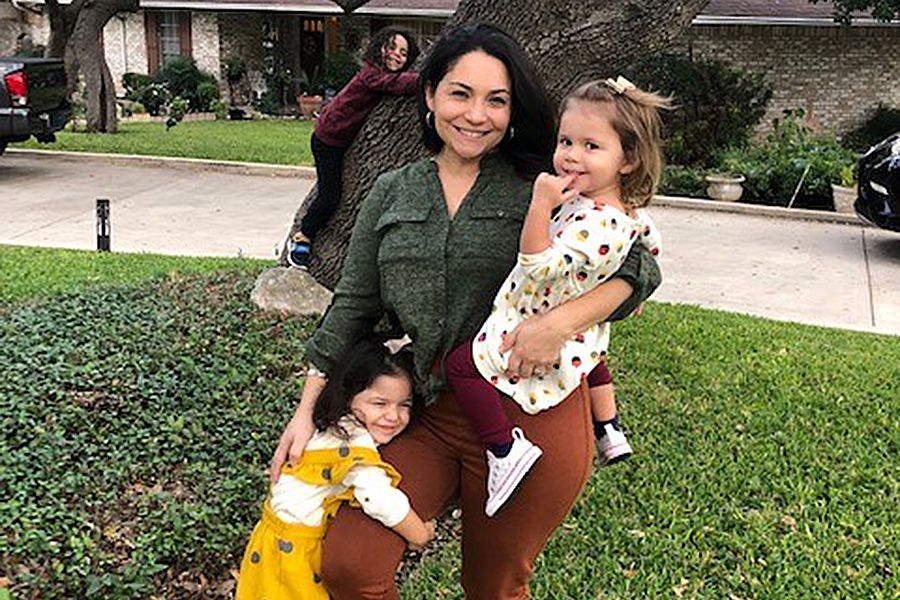UNEXPECTEDLY EXPECTING
Serving women and teens in crisis pregnancies with dignity and compassion
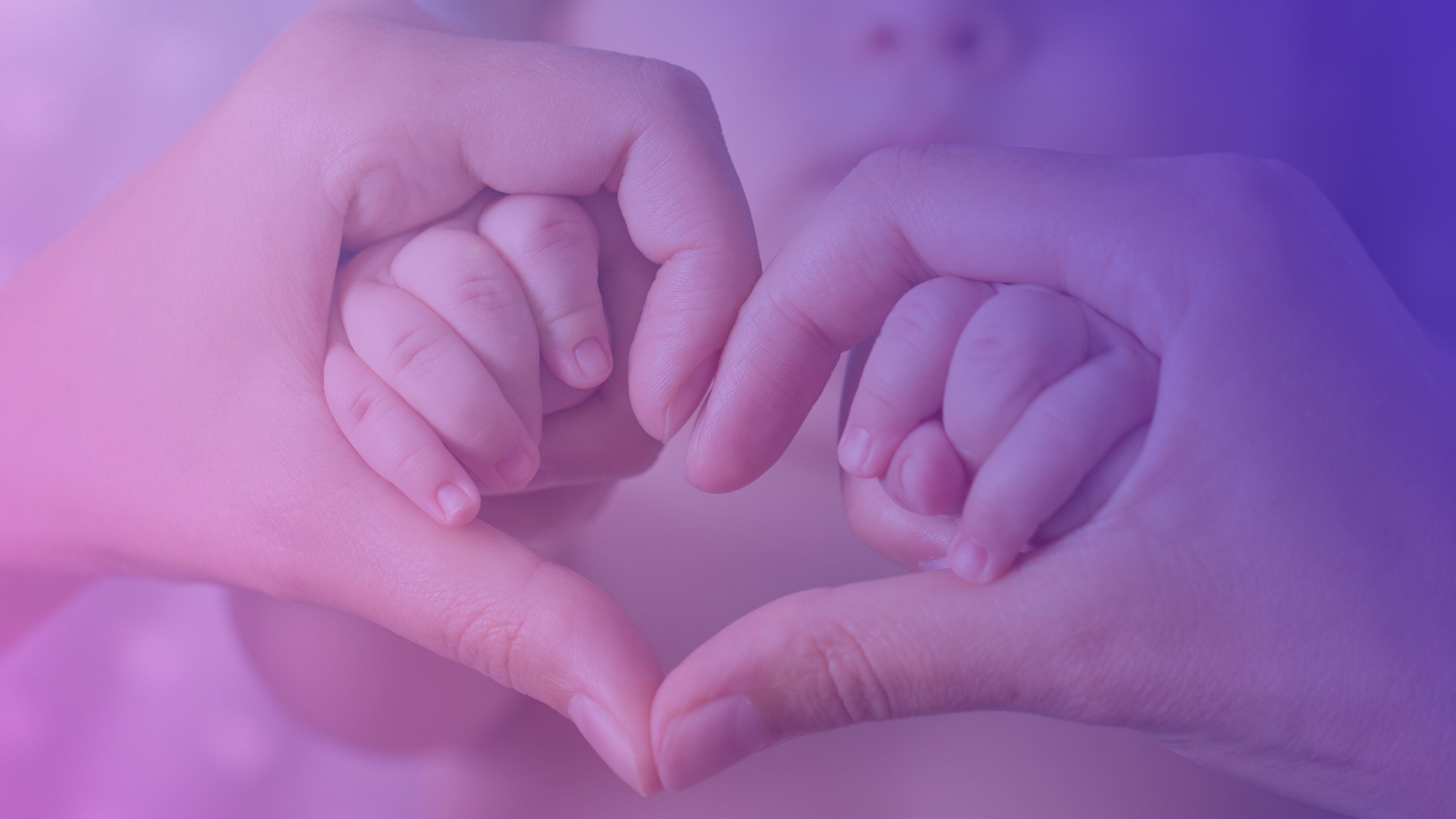
A Complex Reality, Wrapped in a Crisis
It’s difficult being pregnant without a reliable place to live. And parenting an infant without a steady stream of diapers and available health care. And knowing how to constructively discipline a toddler when your only role models were overwhelmed, violent or absent altogether as parents. Perhaps you’re just a kid yourself.
Women or girls who have found themselves in need — short on money or education, pregnant or parenting, possibly alone and scared — often go to a Catholic Charities agency for assistance, maybe because they’ve been referred there by a friend or even the court system. They’ve been advised and accompanied and listened to, whether they visited just once or went back on a regular basis.
The pregnancy services provided by the five agencies profiled here include the basics: confirming that a woman is expecting; distributing diapers, wipes, car seats and baby clothes; offering parenting classes and early childhood education. The services can also be more comprehensive, including full medical care, behavioral health counseling, doula accompaniment, home visits, housing for those experiencing homelessness or adoption services. The agencies have impacted lives in ways both large and small, whether the client is a woman who is already parenting or one trying to decide if she should make an adoption plan.
“We want them to succeed. We want them to do well for themselves. We want them to make healthy decisions,” says Katherine Bowers, program director of Birthline/Lifeline of Catholic Charities Diocese of Palm Beach, Inc.
No matter the services offered, these agencies and their dedicated staff share this foundational goal, even as they know that success is defined differently in every case. What’s right for one woman and family may not be right for another, and outcomes are both long-lasting and hard to predict.
“There are so many layers, especially when you’re working with women in crisis situations” says Susie King-Duncan, a pregnancy services social worker at Catholic Charities Diocese of Baton Rouge.
“Even though it may start seemingly simple, you’re trying to work with all facets of their life. Not just the crisis pregnancy.”
Pictured above: Clients participate in a Nurturing Families infant massage class, which helps them bond with their babies, through Catholic Charities, Archdiocese of San Antonio, Inc.
Denver: Holistic Care, Close Connections
After receiving medical care, counseling and baby supplies at Marisol Health, as well as taking classes and joining a mother's support group, Kisha gave birth to daughter Earline in 2019. The two have flourished and still receive services through Catholic Charities Archdiocese of Denver.
After receiving medical care, counseling and baby supplies at Marisol Health, as well as taking classes and joining a mother's support group, Kisha gave birth to daughter Earline in 2019. The two have flourished and still receive services through Catholic Charities Archdiocese of Denver.
“We really want to retain those connections, because we know people have other challenges that happen in life.”
From 2012 to 2016, Catholic Charities Archdiocese of Denver offered traditional pregnancy services, including pregnancy tests, counseling for women and early childhood education. But a concern about not forming and keeping those connections nagged at Jan, who has been with the agency for 19 years.
“We would have that initial contact with the moms or pregnant moms, and because we couldn’t provide ongoing medical care, we were kind of losing touch with them,” she says.
In 2016, CC Denver contracted with Bella Health + Wellness, which began providing life-affirming medical services to clients. Today, CC Denver operates two medical clinics offering comprehensive OB-GYN care, with a third under construction, set to open in 2024. The program is known as Marisol Health.
CC Denver also provides wraparound supportive services — mental health counseling, parenting education, community engagement and referrals for safe housing with Marisol Homes, where pregnant women and single moms can get back on their feet.
They do all of that, plus distribute clothing, food, baby wipes and “diapers galore,” at 10 Marisol Family sites and via a neighborhood delivery truck, connecting those in need with the necessary services, says Jan. “We cross-refer all the time between these programs, and that’s really the magic behind what makes the women who come through Marisol Health successful. It’s their ability to tap into this broad network of other services relatively seamlessly.”
While the majority of Marisol Health’s clients are either uninsured or on Medicaid, there are no income limits for service. The goal is to provide women experiencing unplanned pregnancies with quality medical care, regardless of ability to pay.
Clients come to Marisol in all stages of pregnancy, but a first trimester visit allows more time to create a healthy relationship with the mother-to-be. Many of the women have complicating factors often associated with poverty, such as diabetes, high blood pressure and obesity (women with high-risk conditions are referred to specialists), as well as unstable living situations that make them much more vulnerable, according to Jan. “So that’s why we have a holistic integrated care approach to support them and their significant other.”
That includes emphasizing maternal mental health by addressing women’s past and current trauma, providing perinatal support groups during pregnancy and postpartum, routine screening for postpartum depression and developing a plan of care and support with mothers, fathers and families.
Marisol Health does try to engage fathers, including through a curriculum developed specifically for them, but the results have been uneven. Men sometimes come to medical appointments, but many clients are single mothers without much support from their child’s father.
Between its two clinics, Marisol Health averages about 500 visits per month or about 300 individual clients, some of whom visit more than once a month. Cross-referrals are key. For instance, a woman experiencing homelessness who is pregnant or parenting will be referred to Marisol Homes, where she can receive shelter, case management, child care for children up to 12 years old and classes ranging from job skills to financial management. Alumnae of the program often remain engaged, returning for counseling or diapers as they find stable footing.
“We just want them to know we’re always here to support them at whatever stage they find themselves,” says Jan, “and know they can come back into our fold and we will love them and care for them.”
Here for the Hugs in Denver
The importance of bonding with your infant is one of the many things Jennifer is learning at Marisol Homes, where women in need of support receive wraparound services through Catholic Charities Archdiocese of Denver.
The importance of bonding with your infant is one of the many things Jennifer is learning at Marisol Homes, where women in need of support receive wraparound services through Catholic Charities Archdiocese of Denver.
Jennifer moved into Marisol Homes in February and delivered son Alais two weeks later. She arrived after a stay in rehab, during which she lost custody of her two older children. “That’s what I’m here for, to get it all together so they can see me,” she says of the kids, 6 and 12, who live with their father.
She’s found the environment to be supportive and the staff loving, with birthday parties, baby showers and moms’ nights to make the women feel special — or better yet, just normal. She’s been gifted a car seat and stroller, as well as baby formula for Alais until her WIC (Special Supplemental Nutrition Program for Women, Infants, and Children) benefits kick in.
Jennifer and Alais feel safe in what she calls her “mansion” of a room at Marisol Homes in an environment that is cleaner than rehab, she says. “They just care about everything we feel and need and even want.”
The Strengthening Families classes are helping Jennifer become a better parent, which is her ultimate goal. “They show me a lot of things that I didn’t know, things I need to know, things I’ve done wrong and could do better,” she says. They also give out hugs when the women could really use one, which means the world to her.
“Nobody cares about us like that anywhere.”
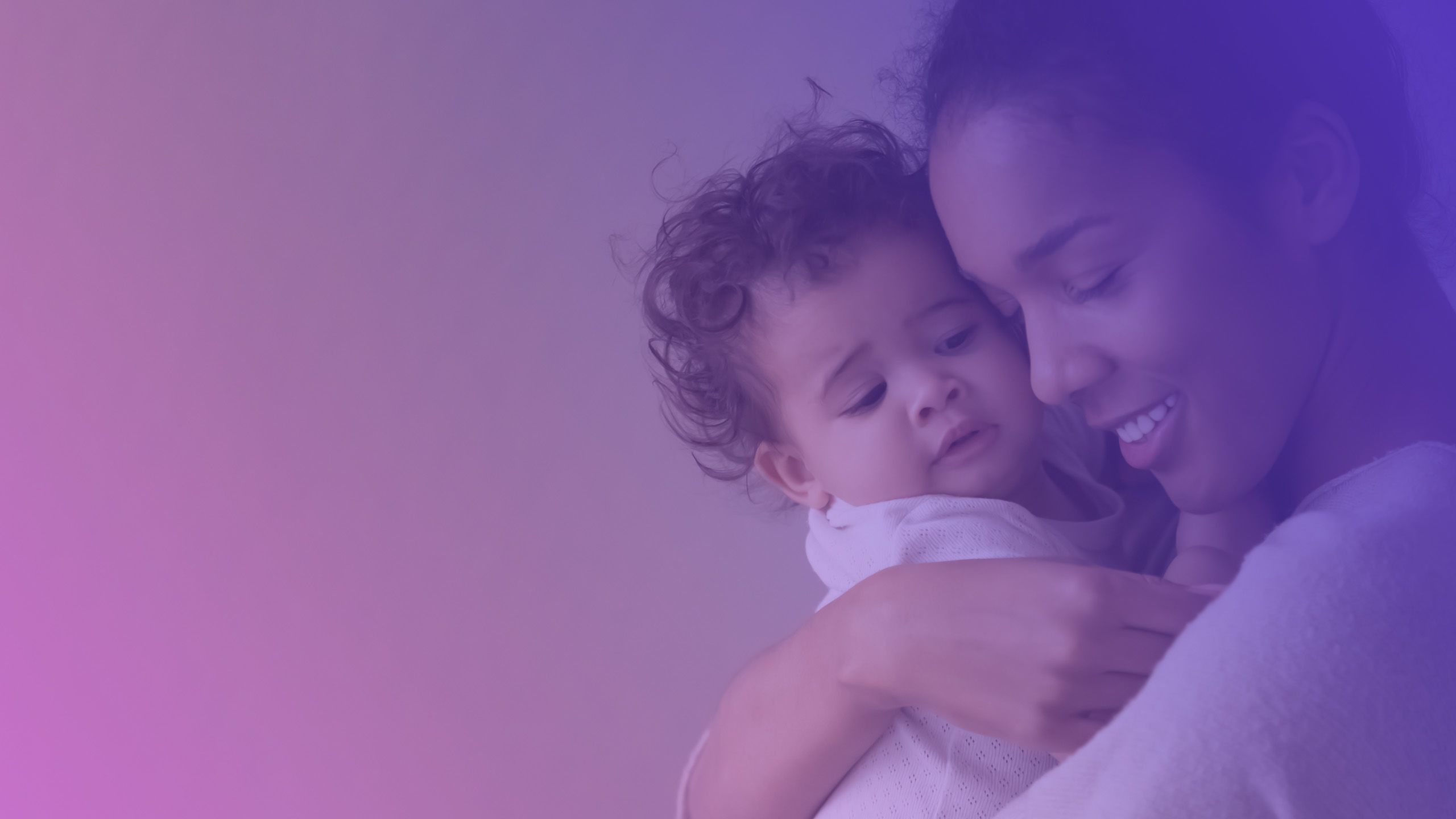
Baton Rouge: The Best Possible Outcome
Home visitors such as Robin, above left, share age-appropriate curriculum and books with clients while modeling good parenting, part of the very popular PACT program of Catholic Charities Diocese of Baton Rouge.
Home visitors such as Robin, above left, share age-appropriate curriculum and books with clients while modeling good parenting, part of the very popular PACT program of Catholic Charities Diocese of Baton Rouge.
“We know everyone doesn’t get the same start in this world.”
Over its 58 years, the Maternity and Adoption program at Catholic Charities Diocese of Baton Rouge has grown from focusing primarily on adoption to offering more extensive services for women experiencing a crisis or unplanned pregnancy. While those services still include help making an adoption plan, if that’s what the mother determines is best for her, Stephanie says that today, “It’s more about assessing what their needs are and determining from there how to best help them.”
CC Baton Rouge offers a weekly diaper and wipes distribution, where staff can assess clients for other material needs — such as car seats, clothes and pack and plays — and for services including food distribution, case management and employment services. Sanctuary for Life provides housing for pregnant mothers experiencing homelessness while they establish work, school and life goals.
It also includes an evidence-based home visitation program — PACT (Parents and Children Together) — that helps parents learn patience and how to be their child’s best teacher with the goal of getting the child ready for school. Home visitors are community members, often PACT graduates; the program is so popular that many participants remain until their children age out, resulting in a waiting list for new clients.
The population CC Baton Rouge serves is not limited to those who are poor in Louisiana’s capital city; in fact, many of their families are mired in intergenerational rural poverty. Most are single parents, with no vehicle, no high school diploma and no job, living in mobile homes with children who score very low on reading and math proficiency.
“Our outcomes are for the children, parents and family as a whole, not just one or the other,” a two-generational approach for which they were trained by Catholic Charities USA (CCUSA), says Stephanie, who began working for CC Baton Rouge 11 years ago as a maternity services social worker. “To me, it’s about helping people be their best selves.”
For some expectant parents, that may ultimately mean “placing” a child for adoption, which Stephanie is quick to say is more thoughtful phrasing than “give up” for adoption. “I’ve never met a mom who had a child who didn’t want that child,” she says, also noting that “parenting” is the preferred term over “keeping.”
Adoptions are complex and call for education, counseling and management of relationships, especially as open adoptions, in which the birth mother may go on to have a relationship with her child and the adoptive family, have become more common.
“It’s really, really, really about what’s in the best interests of the child,” says Stephanie, noting that birth mothers tend to adjust better and have better outcomes long-term when they know their child is well cared for and they don’t have to wonder if it was the right decision.
“It’s ‘Who can best parent this child, based on what this child may need? Who is best equipped?’ Not the other way around.”
Making a PACT to Care for Families in Baton Rouge
Engaging with clients is a highlight of the job for Vickki Maloid, above right, whether visiting them at home or supplying a cash gift card during a financial challenge. Catholic Charities Diocese of Baton Rouge
Engaging with clients is a highlight of the job for Vickki Maloid, above right, whether visiting them at home or supplying a cash gift card during a financial challenge. Catholic Charities Diocese of Baton Rouge
“I am the poster child,” says Vickki Maloid, program manager for PACT or Parents and Children Together, the 10-month home visitation and case management program in the Diocese of Baton Rouge.
Vickki was once a young stay-at-home mom in rural Pointe Coupée, Louisiana. She and her child went through PACT; she then became a home visitor and returned to school for her associate’s degree. Today, she’s nearly completed her master’s in social work.
“I’ve been with the program in one way or another for the past 22 years,” she says, noting that she is from the community herself, as are the other home visitors. Parents see them at church and in the store and are more inclined to trust them as a result.
With 240 parents and children currently enrolled, PACT is based on a weekly, age-appropriate curriculum that is modeled to parents by trained home visitors; parents then teach their children. Its retention rate is 92%, and there is a two- to three-year waiting list to get a spot.
“Families love the activities, and they don’t even realize they’re bonding with their children until later on,” says Vickki. Participants also benefit from peer group meetings, financial literacy classes, parenting tips and workforce development opportunities, since many of the graduates become paid home visitors themselves. Another result is a decrease in the incidence of child abuse.
“It really is a special program,” says Vickki. “The things it does for a family. It’s awesome.”
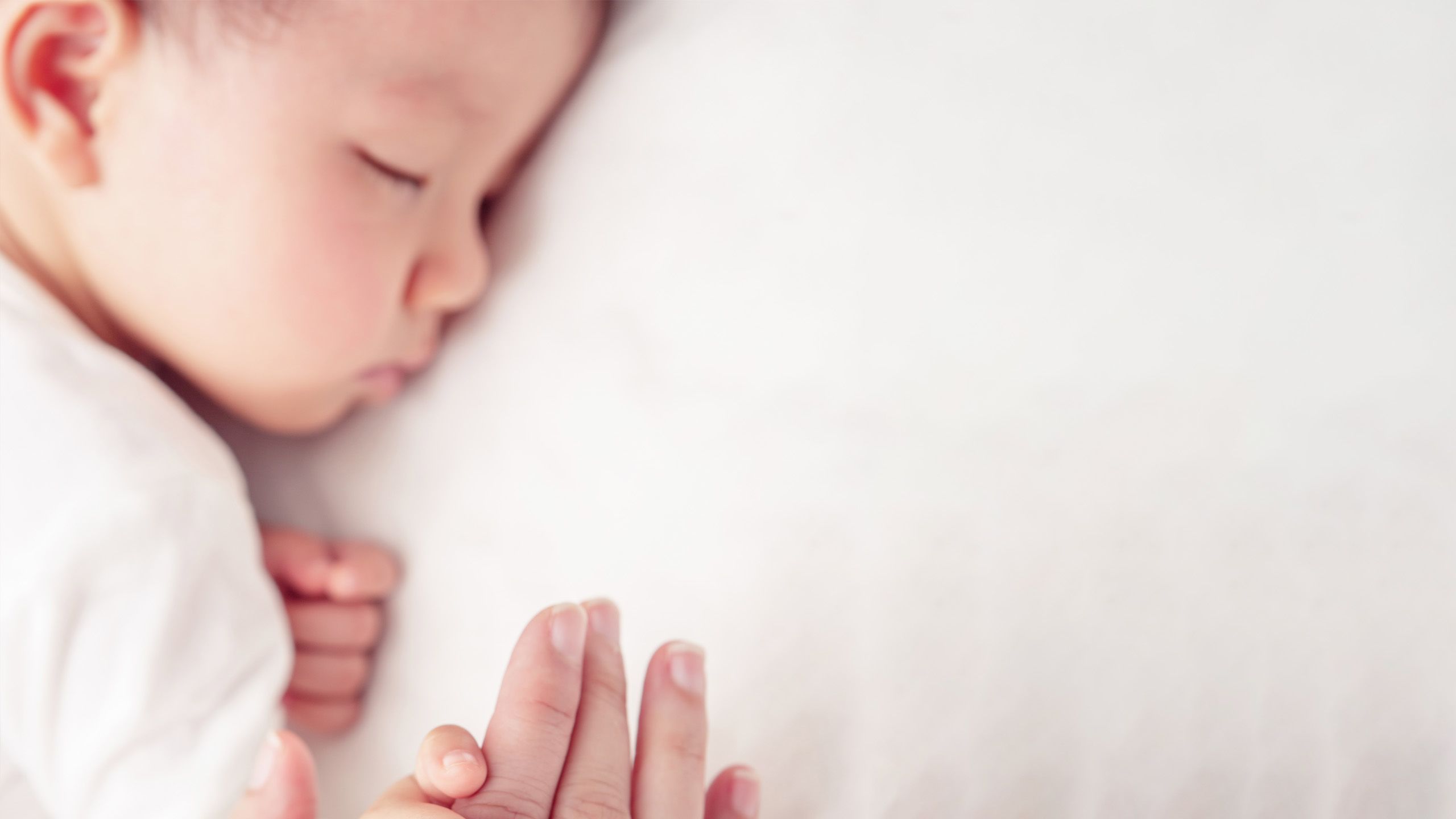
Palm Beach: Providing a Personal Touch
Volunteers sort through donated infant and children's clothing that will be given to women receiving services through the Birthline/Lifeline Pregnancy Care Program of Catholic Charities Diocese of Palm Beach, Inc.
Volunteers sort through donated infant and children's clothing that will be given to women receiving services through the Birthline/Lifeline Pregnancy Care Program of Catholic Charities Diocese of Palm Beach, Inc.
“We provide an opportunity for our clients to really be heard.”
For more than 40 years, the Birthline/Lifeline Pregnancy Care Program has walked with women experiencing unplanned pregnancies, offering a range of services at three centers, with the recent addition of two mobile units that allow staff to reach even more women in the five-county region Catholic Charities Diocese of Palm Beach, Inc., serves.
“It’s a great opportunity for us to expand our services and our help in the area,” says Katherine, who has been program director since 2016. She started as an education coordinator with the agency in 2009, but even as a recent college graduate, she was drawn to working with the program.
As it happens, Katherine’s mother was already volunteering with Birthline/Lifeline and suggested her daughter move back home to Palm Beach from Washington, D.C., where she had attended The Catholic University of America, to work alongside her.
“I really fell in love with what we do and with the clients, the women we serve and all of our volunteers. And I felt like God was really calling me to have this as my career, as my vocation,” she says, although she took an educational detour, to get a master’s in social work, before becoming a fulltime employee.
One of the primary services Birthline/Lifeline offers clients is pregnancy confirmation. While a woman today can easily take an over-the-counter pregnancy test, having that confirmation from a trusted agency like Catholic Charities means she can apply for pregnancy-related Medicaid — which covers prenatal care, delivery and postpartum care — and receive assistance from other local agencies, as well.
CC Palm Beach also offers a free ultrasound within the first 12 weeks of pregnancy — they provided more than 1,000 last year — and material assistance, including maternity and baby clothes. All of their offices have Spanish-speaking staff, and they now have a volunteer and two ultrasound techs who speak Creole, to serve the growing number of Haitian women who come for services.
Although they don’t provide medical care, beyond the initial ultrasound, Katherine says the staff works hard to impress upon women the importance of regular check-ups during their pregnancies. Often, she says, that care comes from public clinics, where clients might not get as much one-on-one attention as higher-income women in a private setting receive.
Birthline/Lifeline works hard to make every woman feel special and welcome when she returns for material assistance or for parenting classes, which include goal setting (education, employment, etc.) for the mother-to-be and her child. And they do that, Katherine says, by being a nonjudgmental, listening presence for women who find themselves in a vulnerable position.
“Everyone around them is chatting and telling them what to do, and no one really sits with them and listens to them and wants to understand their situation,” she says. “We really do that here, out of love and compassion.”
Many of their clients end up returning the baby items they received from CC Palm Beach — all of which are donated and then sorted by volunteers — after their child has outgrown them.
That full circle, says Katherine, “is a testament to just how much they appreciate our help, because they see the value in what we did for them, and they want to help someone else. I think it’s just so beautiful.”

La Crosse: 'God Brought Me to You'
This happy toddler was adopted through Family Services of Catholic Charities of La Crosse, which works with more families hoping to adopt than women looking for pregnancy services.
This happy toddler was adopted through Family Services of Catholic Charities of La Crosse, which works with more families hoping to adopt than women looking for pregnancy services.
“I have never worked with a birth mom who has not wanted to parent their child. For whatever reason, whatever point in their life they’re at, they can’t.”
The story of a woman who sought adoption services from Catholic Charities of the Diocese of La Crosse 20 years ago has stayed with Melissa. She’d just begun working for the agency, and the woman was headed to federal prison. She was also parenting a two-year-old son, and nobody in her family would take him in.
“She was in a really bad place,” says Melissa. “I mean, she just really was in a not-good place.”
The woman placed her son with an adoptive family and then spent more than three years in prison. Upon her release, “She turned to me as a support person and cheerleader. She wanted to get her CNA (certified nurse assistant). She wanted to stay sober. Those were her goals coming out,” remembers Melissa. “And she knew she needed somebody there to support her.”
Support her Melissa did, in what she describes as a mentoring relationship. The woman stayed in school, had more children, turned her life around. She regularly sends photos and updates and, once in a while, comes in for reassurance that she did the right thing by her son all those years ago.
“That’s not uncommon,” says Melissa. Some birth mothers come back years later for support groups and some mentor other clients as they discern whether to parent or place their child for adoption. Some never return.
“It’s all over the place,” says Melissa. There is no typical client, except for the factors that drive them to CC La Crosse in the first place: poverty and a combination of drug and alcohol abuse and mental illness. The children of the women they serve, says Melissa, will more often than not end up in the foster care system if they’re not placed for adoption immediately after birth. She laments the stigma on a pregnant woman who even thinks of placing her child with another family.
“Society feels that no matter what, you should be able to parent your child.” Melissa’s team works hard to respond with compassionate case management as those women struggle to come to a decision, often in the face of resistance from families who may offer little in the way of actual support. “No one can live your life. You need to do what’s in the best interest of you and your child. Those are the two people you need to focus on.”
Annually, CC La Crosse works with between 175 and 225 families looking to adopt, as compared to 50 to 75 women who come to them each year for pregnancy services. Families waiting to adopt must also be certified through the state of Wisconsin as foster families. From the time the birth parents’ rights are terminated to the finalization of the adoption six months later, a placement is considered a foster placement. CC La Crosse has guardianship during this period and oversees the transition of the child and the family.
Melissa can see both sides of the end result, the sweet and the bitter. “You’re working with a birth mom and helping her deal with her loss and grief, and then you turn around and here’s this family whose dream is being fulfilled,” she says.
She draws inspiration from women like her client of 20 years, and a posting she saw on Facebook recently, by a birth mother who placed her child a year ago.
It was a thank you to her child’s adoptive family. “God brought me to you,” the woman wrote. “My son is being raised by the most loving couple on the face of the Earth.”

San Antonio: Accompanying Girls and Women
The Nurturing Families program of Catholic Charities, Archdiocese of San Antonio, Inc., has supported Stephanie, a newly single mother to three children, as she grows in her parenting role, establishing routines, family rules and more.
The Nurturing Families program of Catholic Charities, Archdiocese of San Antonio, Inc., has supported Stephanie, a newly single mother to three children, as she grows in her parenting role, establishing routines, family rules and more.
“Studies are showing women need support. Not a one time, ‘Here’s a gift bag.’ They need continuous support.”
If you think of a birth doula as someone who only assists affluent women during labor, Morgan, a certified doula who has been with San Antonio Birth Doulas since 2018, would like to suggest another scenario, one in which doulas educate, advocate for and encourage women and families with the goal of building confidence that will benefit them for years to come.
“We want to make sure that no woman is birthing alone,” she says of the services that range from nutrition and lactation consultations to support during labor. “We want to make sure that every individual knows they have the power in this situation. They get to make the decisions for themselves and for their babies.”
Morgan works with a team of between 40 and 60, most of them doulas who work for Catholic Charities, Archdiocese of San Antonio, Inc., as contractors. On average, they attend 48 births and accompany 59 new moms each month.
Clients are mostly Hispanic and low-income — although there is no income requirement — with priority given to women on Medicaid, minors, single mothers and women with deployed spouses. They may receive support until their child is three years old, including classes, home-based parenting education, mentorship or material assistance.
“It’s really beneficial to have the wraparound services,” says Natasha Bridges, senior director of Family & Children’s Services. That might look like encouraging a new mother to get screened for post-partum depression and role-playing with her the questions she should ask her care provider about her own health and that of her child. “Our goal is not to do it all for them, because we’re only in their lives for a short amount of time. But we will help guide and coach them so they’re able to advocate for themselves.”
That can be key for an especially vulnerable subset of expectant and parenting moms: those experiencing homelessness. CC San Antonio has two programs to address this need, one for teenagers, called Seton Home, and another for women, called Guadalupe Home.
At Seton Home, which is staffed 24/7, girls may stay until they’re 18, or 21 if they’ve come through the foster care system. They live in efficiency apartments and attend high school while learning to manage a household; picking up life skills; receiving parenting education and counseling; and setting goals for themselves and their child.
Some choose to leave at age 18 even if they don’t have to, says Kari Stewart, vice president of programs. “But we do leave our doors open, so if they go out and give it a try and realize it’s not quite what they thought it would be, they’re able to come back. We’ve had several who’ve done that.”
Currently, Seton Home has 12 residents, whose ages tend to run from 12 to 17. The house provides aftercare and Head Start for children.
Guadalupe Home can host 10 women, who must be pregnant or parenting a child under the age of 3 to qualify. It’s set up like a dormitory, with private rooms and shared common spaces, and is intended for short stays while clients work or attend school. The average resident is in her mid-20s.
For many of those women, life has been hard or even brutal, and the thought of setting goals for themselves is seemingly impossible. It’s easier, says Kari, to start by setting goals for their children and then backing into their own goals. “It’s heartbreaking, because often they’ve given up on themselves.”
The program provides life skills and workforce development, counseling, parenting classes and budget assistance, but it’s all voluntary, and the time these women spend at Guadalupe Home isn’t always enough for the staff to see significant changes in them.
“Where we do see big progress is that feeling of safety and security,” says Kari. Not having to operate from a place of fear allows the women to take a breath and maybe, just maybe, think about the future. That’s a start, she says.
“We tell them when they get here, we want this to be the last place that you are until you get to the place that you want to be.”
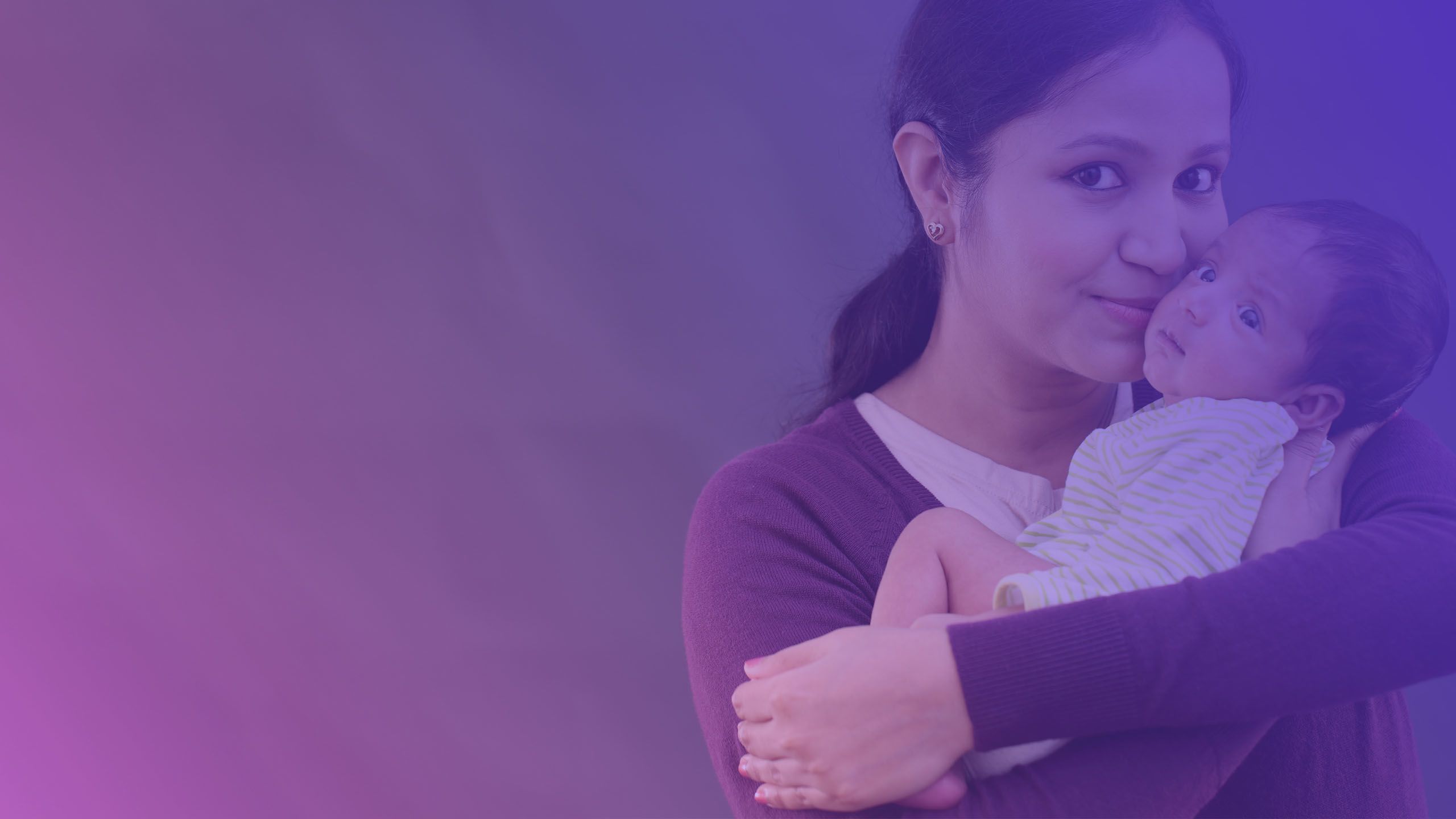
CATHOLIC CHARITIES USA
2050 Ballenger Ave, Suite 400, Alexandria, VA 22314
703-549-1390 | catholiccharitiesusa.org
© 2024 Catholic Charities USA. All rights reserved.
Terms of Service | Privacy Policy
CCUSA is a 501(c)(3) non-profit organization. Federal Tax ID Number 53-0196620

